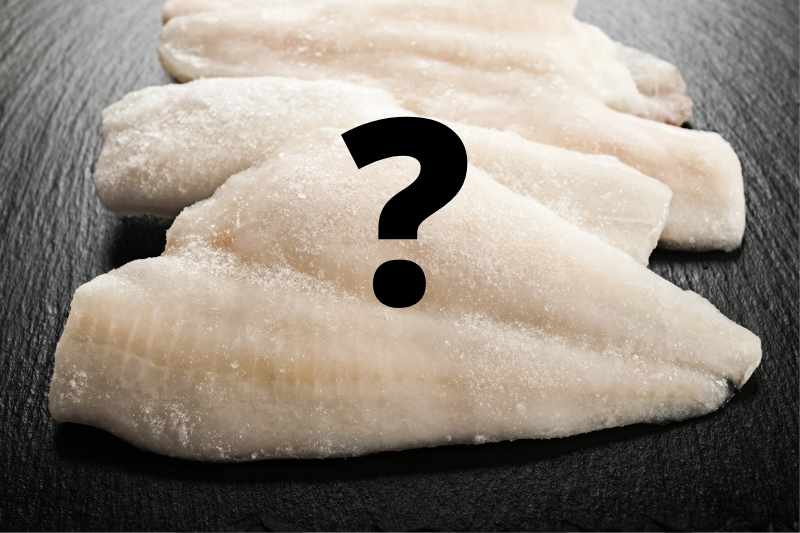Fresh fish may be the first thing that comes to mind when you think of seafood. But what if I were to tell you there’s even more to frozen fish than meets the eye? Flaky, light and perfectly textured.
I’ve always believed that frozen fish is the best kind of fish to eat. Not only is it almost always less expensive, but it tastes better too. The texture is usually firmer and the meat has more flavor.
Before fish are frozen, they are cleaned, gutted and filleted. This is done while they are fresh, not after they have been stored for weeks. Freezing them quickly locks in the freshness.
Fresh fish on the other hand, is never frozen before it arrives at your local supermarket or fishmonger. It is caught, transported to its destination and then sold. It may sit in a refrigerator for several days or even weeks before it is sold. Then when you buy it and take it home, who knows how long it will sit in your fridge before you cook it. So even if the fresh fish is only a couple of days old when you buy it, by the time you eat it, it could be 2 or 3 weeks old.
A lot of people think fish tastes “fishy” because it’s old, but that’s not true. Fish most often tastes fishy if it hasn’t been handled properly.
That means that you shouldn’t be afraid to buy frozen fish, which is often cheaper than fresh and, in many cases, better for you.
A Comparison Between Frozen Fish and Fresh Fish
The difference between fresh and frozen fish is a matter of when they are processed, not whether they are alive or dead. The most significant nutritional difference between fresh and frozen fish is that freezing stops the fat oxidation process that causes a fish’s flesh to go rancid.
As long as a fish doesn’t go rancid (which can happen with fresh fish if it isn’t kept cold during transport, processing, and storage), its nutrient content won’t change. In other words, it doesn’t matter whether you eat a fresh or frozen fish, both will provide the same benefits.
Frozen fish can provide a lot of health benefits as it is high protein source with low saturated fat content. Plenty of Omega-3 fatty acids which are found in fish are very important for the health of heart. A 3-ounce cooked portion of salmon has about 17 grams of total fat, but only about 2 grams come from saturated fat. If you need to limit your fat intake due to another health condition, such as diabetes, you should choose baked fish or broiled rather than fried or breaded.
While fresh fish has long been considered the best option when it comes to flavor and texture, this isn’t always the case. In fact, some species of fish are actually frozen right on the boat after they have been caught or are flash-frozen at sea if the fishing boat doesn’t have a freezer. The freezing process helps prevent spoilage by slowing down bacterial growth.
Omega 3 fatty acids have been demonstrated to help with inflammation all over the body and lower risk for chronic disease. Tuna or salmon type fish are rich in omega 3 fatty acids.
Since the fish are already frozen, it is okay to keep them in the freezer for a long time. You can buy them in bulk and store them for a few weeks or even months.
You don’t have to worry about the quality of frozen fish as they are usually flash-frozen right after getting caught.
Frozen fish usually comes pre-packed, which makes it easy to store and cook later. Pre-packed fish also means that you know exactly how much you are consuming and how much calories you are taking in.
Fish is world’s most nutritious foods on our planet. It is full of important nutrients, such as vitamin D and protein. Fish is also the world’s best source of omega-3 fatty acids that are essential for your body’s and mind’s health. Every type of fish is not equal. Some types contain more mercury than others, while some provide many important nutrients or health benefits.
The Upside to Buying Frozen Fish

Frozen fish is a great alternative to fresh fish if you’re on a budget or concerned about sustainability.
While there are many benefits to buying frozen fish, there are also some drawbacks you should know about.
Look at the label on a package of frozen fish, and it might say something like, “Product of China.” Or Thailand. Or Chile. And if you’re like most Americans, you probably just put it back in the freezer, thinking that nothing good could come from eating it.
But think again. Frozen fish can actually be more nutritious than fresh fish not to mention cheaper, more abundant and easier to get your hands on.
Fresh fish is often caught hundreds or even thousands of miles from where it’s sold, so it must be frozen before it arrives at your local market. But because whole fresh fish doesn’t travel well, the food industry has developed a system that allows for individual fillets to be packed, frozen and shipped all over the world within hours of being caught.
Frozen fish samples actually contain more omega-3 fatty acids, which are essential nutrients that promote heart health and are known to reduce inflammation in your body, among other benefits. And since many types of fish are high in mercury and other contaminants, choosing frozen varieties might minimize your exposure to those compounds as well.
There are a variety of other reasons why you should buy more frozen fish, such as:
- Good for your wallet
As many families are finding it more difficult to make ends meet, cutting down on food costs is a good place to start. When foods are seasonal or on sale, freezing them is a terrific method to stock up on greater quantities. So you may take advantage of lower seasonal rates all year long.
- Good for your health
Food products are usually superior to fresh foods since they can be picked at their optimum and frozen immediately, preserving the nutrients. If you don’t have time for cooking from scratch on a daily basis, frozen dinners can provide a more nutritious supper than ready-to-eat or fast-food options.
- Convenient and Time Saving
Frozen fish is convenient because it doesn’t need to be defrosted. This means that you can just pop it into the microwave or frying pan without having to wait for it thaw out in advance. It also makes cooking easier because there won’t be any sticky residue left over on your hands after handling raw meat. Frozen seafood also lasts longer than fresh seafood so if you don’t plan on eating within 24 hours then freezing may be your best bet!
Having a selection of frozen foods in stock means that there will always be something for anyone who drops by whether it is for an impromptu dinner party or just an unexpected guest popping in during lunchtime.
- Frozen food retains most of its nutritional value.
Generally speaking, yes, freezing preserves nutrients.
That’s not to say that freezing is the best way to preserve nutrients in general, but it’s superior to other ways of storing fish after they’re caught.
Fresh fish is an excellent source of omega-3 fatty acids, high in protein and low in calories. But fresh fish doesn’t last long, which has prompted many people to turn to frozen fish. Though it’s not quite as nutritious as fresh fish, frozen fish can retain much of its nutritional value if handled properly.
Fish is a delicious and healthy addition to any diet. It’s high in protein and healthy omega-3 fatty acids also help lower blood pressure and triglycerides, prevent heart disease and diabetes, boost the immune system and even improve mood.
- There is less wastage
Another advantage of buying frozen fish is that there is less wastage. The packaging contains very little air so all the moisture is retained, unlike with fresh fish which can dry out and lose its flavor if stored for too long. If you only eat small portions of fish then having larger, frozen fillets means that you can defrost and use as much as you require at any one time, which means less waste overall.
Frozen seafood also tends to be cheaper than fresh seafood and this can be a big incentive to buy in bulk if your freezer has enough space to store it all!
- It is available in plenty of variety
Frozen fish is available in plenty of variety, from cod and haddock to salmon and mackerel.
Frozen fish is often fresher than fresh fish because it’s frozen just after being caught and at the height of its freshness. The taste, texture and nutritional value of frozen fish are all preserved at their best with this speedy process.
Common Myths About Frozen Fish

Frozen fish can be a Godsend, but there are many common myths that may prevent you from taking full advantage of this frozen food. It is time to debunk these myths and show you how frozen fish can be a healthy staple in your diet.
Some popular myths regarding frozen Fish are:
- Frozen fish is poor and low in quality
- Freezing ruins the fishy texture
- Freezing destroys all the nutritive benefits
- Frozen fish is just excellent as fresh Whenever it come to mercury content
- Room temperature is best to defrost frozen fish.
3 Tips to Keep Fish Fresh in the Freezer
Fish is one of the healthiest foods you can eat, but nothing ruins a good piece of fish faster than finding freezer burn on it. Luckily, it’s easy to keep fish fresh in the freezer and avoid getting freezer burn. There are just a few things you need to remember.
Tip#1: Buy Quality Fish
If you start off with quality fish, you’ll end up with quality fish. It may seem obvious, but it’s worth noting that the most important thing you can do to keep your fish fresh is to buy high-quality fish and store it properly. If you buy good quality fish, it will last longer and taste better in the end.
Tip#2: Buy Fresh Fish Whenever Possible
Buying fresh fish rather than frozen is always the best option when available. Even though freezing slows down bacteria growth and allows you to keep your catch longer, there’s still a chance for your fish to go bad if not stored properly. Unless you have a dedicated commercial freezer for storage, it’s better to consume fresh caught fish as soon as possible after catching them.
Tip#3: Don’t Freeze Fish Too Long
If stored properly in an airtight package or vacuum sealed bag, it will remain fresh. But it is recommended to freeze fish not for long period. Try to use it within 2 months.
Popular Frozen Fish Suppliers in UK
Frozen fish is a brilliant way to stock up on your seafood. It’s often cheaper, it lasts a long time and you can cook with it straight from frozen.The freezing process locks in the flavor and nutrients, so you can buy frozen fish with confidence. In fact, fresh fish often has been frozen, stored for a long time, thawed and displayed for sale.
Popular frozen fish suppliers in UK (Frozen fish suppliers) are:
- John West Foods
- Birds Eye
- Pentagon Food Group
- Young’s
- M&J Sea Foods
Common FAQs About Frozen Fish

Frozen fish is not treated or processed except for the freezing process. To be clear, only fresh fish is processed while still fresh and never frozen.
No, frozen fish is not unhealthy. Freezing does not diminish the nutritious value of fish. The freezing procedure does not affect protein, fat, or fat-soluble vitamins such as vitamins A and D. Frozen fish is perfectly healthy and contains no additional ingredients to make it unhealthy.
It is recommended for staying on the safe side and limiting the shelf life of fish to a maximum of 6 months, but there is no real evidence to suggest that fish will be unsafe if kept frozen for longer than 6 months.
If frozen correctly, the fish will remain at its best quality for 2-3 months. However, if it is kept in the freezer longer than that, it might be safe to eat but it won’t be at its best quality anymore.
To determine whether a fish is spoiled, look at its eyes, gills, and flesh for signs of spoilage. The gills should be bright red; if they are brownish then they may be spoiled. If the eyes are not cloudy or sunken in, then the fish is old and maybe spoiled already. If any parts of the flesh appear dry, slimy, or wrinkled, then that part of the fish may already be spoiled.
Look in your local fish store. They will usually have it in 10lb bags or more. Check with your local Asian or African markets too! They usually carry frozen fish in bulk, too. Chinese markets tend to have a large selection of seafood like scallops, crab legs, shrimp, squid, and more. Lastly, look at your local grocery store; they may also carry frozen fish in bulk.
Frozen fish generally lasts for about 6 months, but it will go bad long before that. The main issue with frozen fish is freezer burn and oxidation. Freezer burn is what happens to the outer layers of food when they’re exposed to air. It’s caused by air getting into the fish and freezing it to the surface, drying out the fish and giving it an off-putting appearance, odor, and taste. Freezer burn can also cause discoloration.
Frozen fish lasts at least six months in the freezer and potentially much longer than that(some say up to a year).
The nutritional value of most foods actually increases with freezing! Because when food is frozen, its nutrient composition is preserved or even enhanced.” “Freezing food stops the action of the enzymes that cause many foods to deteriorate rapidly.
While the majority of fish is frozen, there are some exceptions where it is not. Some types of fish are eaten very fresh, such as salmon and tuna. In general, fish that live in frigid water or in deep waters tend to be less likely to be frozen. There are also various species of fish available only fresh, such as anchovies, herring, and sardines.
The reason frozen fish is popular today is that seafood is still relatively inexpensive, and freezing it extends its shelf life. Frozen fish is fresher than many other products.
Cutting fish into pieces can be tricky, even for a professional chef. With a firm grip, slice through the skin with a sharp knife. It may take you two or three attempts to use enough force and get through the skin without going into the flesh.
Once you’ve gotten through most of the skin, a pair of scissors with a curved blade (instead of straight) will make it easier to cut through thin bones. Use your fingers to pull back on the skin as you cut through it with shears in order to avoid cutting into any flesh while cutting out any bones and fins that may be inside.
Always keep any food out of the “temperature danger zone.” This means that food should never sit out at room temperature for more than two hours.
Yes, frozen fish is healthy. According to the American Heart Association, frozen fish is low in saturated fat and contains omega-3 fatty acids, lowering blood pressure and reducing the risk of heart attacks. Most fish supply small amounts of iron and calcium as well. Frozen fish is a healthy option if properly stored and prepared. Frozen fish can be healthy if you store and prepare them properly. The taste, texture, and bacterial content of fish can be affected by their freshness and how quickly they are frozen.
Yes, it is good for you as fresh fish. It has many health benefits, in frozen fish, you’ll get essential nutrients like omega-3 fatty acids and lean protein, as in fresh fish. According to the Natural Fisheries Institute. In the same way that fresh fish is nutritious, properly frozen fish retains its nutritional value, moisture, and taste after harvest.
Frozen fish should be safe to eat even after 4 months, but the quality might differ. Food poisoning bacteria cannot grow in the freezer no matter how long it has been frozen. Because of how our fish is packed, the fish should be safe from freezer burn and not be damaged by the freezing process.
Don’t defrost fish at room temperature or in warm or hot water, as bacteria multiply quickly. Using cold water to defrost fish is a faster and more popular method. The fish should be packaged in a sealed bag and soaked in water to retain its flavor and safety.
If you want to avoid thawing, baking, poaching, or steaming are the best ways to prepare fish. Pan-frying should be avoided because the fish may lose too much water, or the flesh will not be uniformly cooked. You can increase the cooking time to guarantee that the frozen fish is thoroughly cooked. Because cooking durations vary depending on the thickness of the fillets, it’s ideal for keeping an eye on your fish to ensure it’s tender, flaky, and properly cooked.
Protein, vitamin B-12, and niacin are all included in fish sticks. Frozen fish sticks typically provide 3 grams of protein per stick. As a result, consuming five fish sticks provides around 15 grams of dietary protein. Protein promotes good weight control, enhances satiety, and aids in the development and repair of muscular tissue. Because most fish sticks are breaded and fried, they are high in calories. Fish sticks contain a lot of salt, which might be dangerous if you have high blood pressure or heart problems.
Summing it up!
Overall, as you’d know by now, the differences between frozen and fresh fish are minimal. It all really depends on your need for convenience and personal preference. Also, there is no doubt that preference should play a major role in your purchase decisions, there’s another equally important factor you need to consider: where has the fish come from? Get to know the frozen food suppliers near you. From where do they bring their stock? How do they transport their supplies? What quality standards do they follow? By being informed on where the fish was brought from and how it was raised, you’ll be able to make a better choice for you and your family.
Are you looking for a Free Consultation for Food Services Distribution? Click Here!




